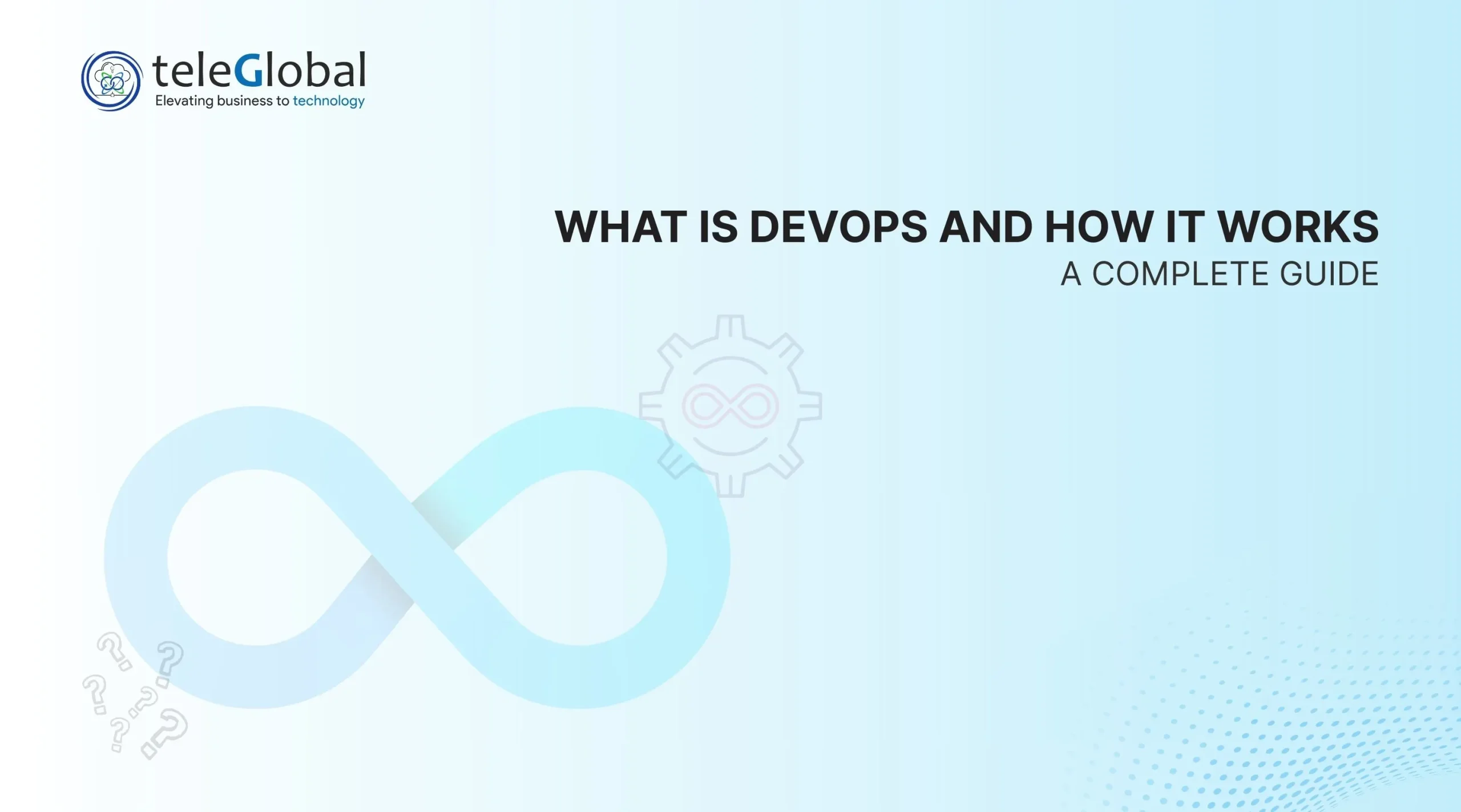
| Author: Kamlesh Kumar | Published: 13-Jan-2026 |
DevOps is changing how modern businesses develop and deploy software. But what exactly is DevOps, and how does it work? Our blog covers the concept, lifecycle, essential tools for DevOps implementation, and how your business can benefit from adopting Devoop. Let’s understand it in depth.
What is DevOps?
Software development (Dev) and IT operations are interrelated in the realm of DevOps. It aims to strengthen the partnership between developers and operations teams so that releases of the software can be done more quickly with automated release times and quality. DevOps focuses on:
- Continuous integration (CI)
- Continuous delivery/deployment (CD)
- Automation of infrastructure
- Enhanced collaboration between teams
- Improved software reliability and stability
In simple terms, DevOps is about removing barriers between development and operations teams to improve software delivery efficiency.
How DevOps Works? Understanding the DevOps Lifecycle
Understanding the lifecycle of DevOps is important? The interconnection of phases enables them to enhance each stage and deliver software at a faster pace. The DevOps lifecycle is outlined here:

The continuous nature of the lifecycle minimizes downtime and enables rapid innovation, keeping your business on track.
Essential DevOps Tools
The choice of tools is crucial for DevOps professionals. Here are critical DevOps tools that are essential for your business:
- CI/CD: Jenkins, AWS CodePipeline, Azure Pipelines
- Version Control: Git, GitHub, Azure Repos
- Infrastructure as Code (IaC): Terraform, AWS CloudFormation
- Containerization: Docker, Kubernetes
- Security (DevSecOps): SAST/DAST scanning tools
- Monitoring & Analytics: Prometheus, Grafana
The automation by each tool reduces human error and improves the efficiency and reliability of your workflows.
AWS DevOps Solutions
Manage your cloud infrastructure with AWS DevOps solutions. AWS offers potent services that facilitate the rapid implementation of software, including:
- The AWS CodeCommit tool provides secure repositories for version control.
- The fully managed continuous integration service offered by AWS CodeBuild is a great option.
- The deployment of code can be automated using AWS CodeDeploy.
- Automated code construction, testing, and deployment can be done using AWS CodePipeline.
Many businesses that require a reliable, scalable cloud infrastructure and want to be secure often opt for AWS because of its extensive features.
Azure DevOps Services
For organizations that use Microsoft technologies, the Azure DevOps services provide a range of useful tools:
- The use of Azure Boards enables the implementation of agile planning and tracking.
- CI/CD pipelines for continuous delivery using Azure Pipelines.
- Azure Test Plans for automated testing and QA.
- Using Azure Artifacts, you can securely distribute and oversee software packages.
Azure DevOp streamlines the process of software development, enhances teamwork, and works seamlessly with existing Microsoft systems.
Why You Should Consider DevOps Consulting Services
When faced with business difficulties such as:
- Slow and complex software deployments.
- Post-release issues or frequent glitches.
- Inefficient collaboration between teams.
- Difficulty managing cloud environments.
The optimal course of action is to utilize DevOps consulting services. Specialists in DevOps provide strategic direction and guidance to ensure efficient implementation of best practices, tailored to your business objectives.
Benefits of Managed DevOps Services
Your organization can use managed DevOps services to alleviate the challenges of managing its operations. Key benefits include:
- Continuous monitoring and proactive support.
- Expert management of CI/CD pipelines.
- Lowered downtime and problem problems were resolved faster.
- Efficient management of cloud infrastructure.
- Cost-effective solutions with high ROI.
By selecting managed DevOps, your internal team can concentrate on the core business instead of infrastructure management.
Enterprise DevOps Solutions
Legacy systems cannot be merged with new technologies, which presents distinct challenges for enterprises. Such problems are addressed by enterprise DevOps solutions, which include:
- Customized DevOps implementation.
- Microservices architecture management.
- Strong infrastructure scalability.
- Enhanced security through DevSecOps integration.
This individualized approach ensures that DevOps implementation is in line with your business objectives and security requirements.
Conclusion
Whether you’re starting your DevOps journey or scaling an existing environment, understanding what is DevOps and how it works is crucial. With automation, collaboration, and the right tools, you can transform your software delivery.
Automated software delivery is made possible for AWS DevOps solutions through the use of CodePipeline, CodeBuild, and CodeDeploy cloud tools. Our mission is to simplify DevOps for businesses of all sizes—so you can innovate faster, safer, and more reliably.
Frequently Asked Questions
What is DevOps?
In DevOps, development and operations are closely linked to improve software collaboration in a way that facilitates faster, more efficient delivery.
How DevOps works?
DevOps automates various software development stages, including planning, development, testing, deployment, and monitoring.
What are DevOps consulting services?
Strategic planning, tool selection and implementation guidance are among the services provided to help organizations implement DevOps practices with efficiency.
What are AWS DevOps solutions?
Automated software delivery is made possible for AWS DevOps solutions through the use of CodePipeline, CodeBuild, and CodeDeploy cloud tools.